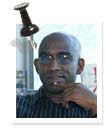Quote of the week
When a foreigner resides among you in your land, do not mistreat them. The foreigner residing among you must be treated as your native-born. Love them as yourself, for you were foreigners in Egypt. I am your God – Leviticus 19:33-34.
Consequently, you are no longer foreigners and strangers, but fellow citizens with God’s people and also members of his household, built on the foundation of the apostles and prophets, with Christ Jesus himself as the chief cornerstone. In him the whole building is joined together and rises to become a holy temple in the Lord. And in him you too are being built together to become a dwelling in which God lives by his Spirit – Ephesians 2:19-22.
Christian Bible
Unlikeable Mr. Roberts fit to write a biography?
 y opinion disastrous) policies, such as the HIV/AIDS fiasco.
y opinion disastrous) policies, such as the HIV/AIDS fiasco.
I am not a great fan of Mr. Roberts and have written on this Blog about his unfortunate defamation case, but I suspect he is correct when he predicts that the liberal white establishment is going to pull the book to pieces for all the wrong reasons.
Myburg conclude his “review” as follows:
One oddity of the book is that very little of it is taken up with documenting and elucidating Mbeki’s own views, which do not seem to be of particular interest to the author. It is divided instead between “a theoretical dogfight in ideological outer space” (as Rian Malan put it) and vindictive attacks on Mbeki’s critics and opponents. At one stage Roberts writes (p. 125) that The Discourses by Niccolò Machiavelli’s are what really “illuminates Mbeki’s statesmanship.” Yet, in that work Machiavelli advised:
I hold it to be a proof of great prudence for men to abstain from threats and insulting words towards any one, for neither the one nor the other in any way diminishes the strength of the enemy; but the one makes him more cautious, and the other increases his hatred of you, and makes him more persevering in his efforts to injure you.
“It is the duty”, Machiavelli continued, “of every good general or chief of a republic, to use all proper means to prevent such insults and reproaches from being indulged in by citizens or soldiers.” This is advice the presidency has clearly chosen to ignore. By supporting this project, in the way that they did, the presidency were clearly hoping to buttress Mbeki’s position, both morally and politically. Yet they may find that this book – which manages to direct “harsh sarcasms” against so many different people – has precisely the opposite effect intended.


